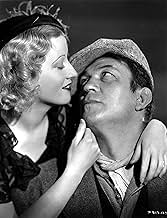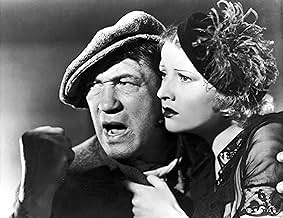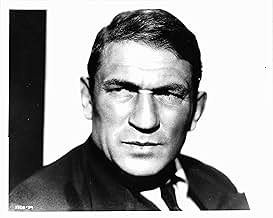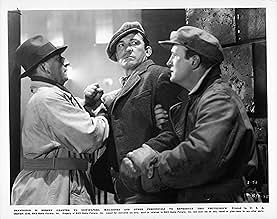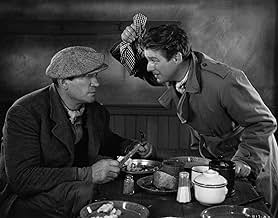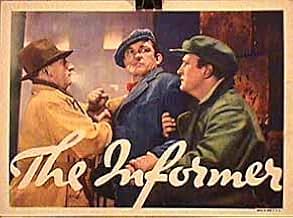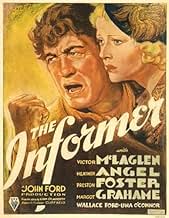PUNTUACIÓN EN IMDb
7,4/10
7,4 mil
TU PUNTUACIÓN
En 1922, un rebelde irlandés delata a su amigo, pero finalmente se arrepiente.En 1922, un rebelde irlandés delata a su amigo, pero finalmente se arrepiente.En 1922, un rebelde irlandés delata a su amigo, pero finalmente se arrepiente.
- Ganó 4 premios Óscar
- 10 premios y 4 nominaciones en total
Joe Sawyer
- Barty Mulholland
- (as Joseph Sauers)
Steve Pendleton
- Dennis Daly
- (as Gaylord Pendleton)
Denis O'Dea
- Street Singer
- (as Dennis O'Dea)
Frank Baker
- Small Role
- (sin acreditar)
Argumento
¿Sabías que...?
- CuriosidadesJohn Ford kept Victor McLaglen continually off-balance (and thus in character) by getting him drunk, changing his schedules, verbally abusing him on and off the set and filming scenes when he'd told McLaglen that they were only rehearsing. For the crucial rebel court scene, the story goes that Ford reduced the actor to a trembling wreck by promising him the day off only to bring him into the studio early and extremely hung over, insisting that he spit out his lines. McLaglen was so furious with Ford over this that he threatened to quit acting and kill the director.
- PifiasFrankie McPhillip tells his mother he travelled to her house via O'Connell Street. In 1922, the year the movie is set, O'Connell Street was still offically called Sackville Street, but the Irish Home Rule Party had unsuccessfully attempted to change it to "O'Connell Street" prior to this and this name was commonly used by nationalist Dubliners.
- Citas
Gypo Nolan: And now the British think I'm with the Irish, and the Irish think I'm with the British. The long and short of it is I'm walkin' around without a dog to lick my trousers!
- Créditos adicionalesOpening credits prologue: 1920 "Then Judas repented himself-and cast down the thirty pieces of silver - and departed."
- Versiones alternativasSince it's original release, the UK prints of this film have omitted all references to the IRA, but a 1998 release on a budget video label restores these cuts for the first time.
- ConexionesFeatured in Directed by John Ford (1971)
Reseña destacada
I don't doubt that Victor McLaglen won his Best Actor Oscar for this film by dint of a three way split among the Mutiny on the Bounty leads of Clark Gable, Charles Laughton, and Franchot Tone who were all in the same race. But The Informer is still a fine film because John Ford wouldn't have gotten his first Best Director Oscar if it wasn't. No split involved in his award.
The movie and the story by Liam O'Flaherty that it is based on involves a poor simpleton of a man named Gypo Nolan who was once a member of the Irish Republican Army. He was cashiered out of it for some imbecilic stunt he pulled and wants back in. He's down to his last pence and if he can't get back in, wants enough for passage to America. There's a twenty pound reward for information leading to the arrest of a former comrade named Frankie McPhillip played by Wallace Ford. In a moment of weakness he goes to the Black and Tan constabulary and informs on McPhillip.
The IRA is pretty anxious to find out who ratted McPhillip out and they're pretty certain it was McLaglen. He hasn't the wit to really cover his own tracks. He does make a feeble effort to implicate another man named Peter Mulligan played by Donald Meek. He also picks up a hanger-on played by J.M. Kerrigan.
The whole action of The Informer takes place in 1922 in Dublin from about six in the evening to early the following morning. Of a necessity it is shot in darkness and shadows, making it possibly the first noir thriller. Had it been done post World War II The Informer would have ranked as a great noir classic, like Odd Man Out or the The Third Man which it bares a lot of resemblance to.
John Ford knew this world very well. He took some time off during the Rebellion and was in Ireland at the time and had a brother who was in the IRA. His real name before having it anglicized was Sean O'Fiernan.
Preston Foster plays the IRA commandant Dan Gallagher. In the book Gallagher is a harder and meaner man than Foster has him here. My guess is that John Ford wanted him as a sympathetic character to give movie fans some rooting interest. He makes it clear that Foster has to eliminate the informer because the Black and Tans will grab him and get quite a bit more out of him and put the whole organization in peril.
The IRA trial scene is the highlight of the film. When Foster asks Donald Meek whether he recognizes the authority of their court, Meek ain't in a position to say no. The King's justice and writ does not run here. It graphically illustrates at that point despite occupation by army troops and constabulary, the British are indeed losing their grip on the population.
Of course The Informer a rather grim story has its John Ford touches, but rather fewer than you would expect. Even as McLaglen is spending his money on a drunken spree, the IRA is constantly in the shadows watching him and counting every farthing.
The Informer is a tale well told about Ireland in a grim and dismal time.
The movie and the story by Liam O'Flaherty that it is based on involves a poor simpleton of a man named Gypo Nolan who was once a member of the Irish Republican Army. He was cashiered out of it for some imbecilic stunt he pulled and wants back in. He's down to his last pence and if he can't get back in, wants enough for passage to America. There's a twenty pound reward for information leading to the arrest of a former comrade named Frankie McPhillip played by Wallace Ford. In a moment of weakness he goes to the Black and Tan constabulary and informs on McPhillip.
The IRA is pretty anxious to find out who ratted McPhillip out and they're pretty certain it was McLaglen. He hasn't the wit to really cover his own tracks. He does make a feeble effort to implicate another man named Peter Mulligan played by Donald Meek. He also picks up a hanger-on played by J.M. Kerrigan.
The whole action of The Informer takes place in 1922 in Dublin from about six in the evening to early the following morning. Of a necessity it is shot in darkness and shadows, making it possibly the first noir thriller. Had it been done post World War II The Informer would have ranked as a great noir classic, like Odd Man Out or the The Third Man which it bares a lot of resemblance to.
John Ford knew this world very well. He took some time off during the Rebellion and was in Ireland at the time and had a brother who was in the IRA. His real name before having it anglicized was Sean O'Fiernan.
Preston Foster plays the IRA commandant Dan Gallagher. In the book Gallagher is a harder and meaner man than Foster has him here. My guess is that John Ford wanted him as a sympathetic character to give movie fans some rooting interest. He makes it clear that Foster has to eliminate the informer because the Black and Tans will grab him and get quite a bit more out of him and put the whole organization in peril.
The IRA trial scene is the highlight of the film. When Foster asks Donald Meek whether he recognizes the authority of their court, Meek ain't in a position to say no. The King's justice and writ does not run here. It graphically illustrates at that point despite occupation by army troops and constabulary, the British are indeed losing their grip on the population.
Of course The Informer a rather grim story has its John Ford touches, but rather fewer than you would expect. Even as McLaglen is spending his money on a drunken spree, the IRA is constantly in the shadows watching him and counting every farthing.
The Informer is a tale well told about Ireland in a grim and dismal time.
- bkoganbing
- 15 feb 2006
- Enlace permanente
Selecciones populares
Inicia sesión para calificar y añadir a tu lista para recibir recomendaciones personalizadas
- How long is The Informer?Con tecnología de Alexa
Detalles
Taquilla
- Presupuesto
- 243.000 US$ (estimación)
- Duración1 hora 31 minutos
- Color
- Relación de aspecto
- 1.37 : 1
Contribuir a esta página
Sugerir un cambio o añadir el contenido que falta

Principal laguna de datos
By what name was El delator (1935) officially released in India in English?
Responde

